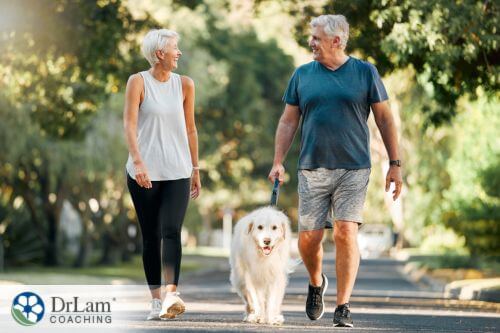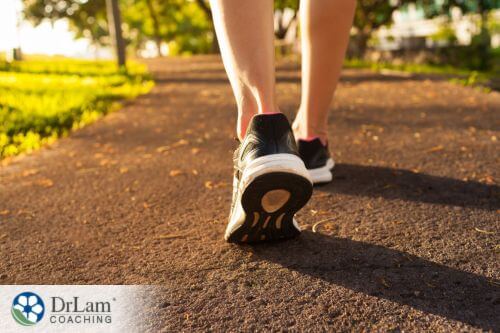Based on research findings, there appears to be a connection between walking and life expectancy. Walking is a simple, yet, effective form of physical activity that can help you become a healthier you as you age and may decrease your risk of developing chronic diseases, ultimately leading to a longer, healthier life. Here's the evidence behind walking for longevity.
 According to the University of Cambridge researchers in an article published in the British Journal of Sports Medicine, as little as 11 minutes per day of moderate-intensity physical activity, like a brisk walk, is enough to decrease the risk of conditions, like certain cancers, heart disease, and stroke, which can lead to early death.
According to the University of Cambridge researchers in an article published in the British Journal of Sports Medicine, as little as 11 minutes per day of moderate-intensity physical activity, like a brisk walk, is enough to decrease the risk of conditions, like certain cancers, heart disease, and stroke, which can lead to early death.
The recommended amount of moderately-intense physical activity that adults should participate in is roughly 150 minutes or roughly 75 minutes of vigorous-intensity activity weekly. While this is the recommendation, if you find that it’s not manageable for you, you can start out with less and work your way up to the 75-minute activity. Some exercise is better for the support of longevity than no exercise at all.
Furthermore, the findings indicate that 75 minutes a week of moderate activity, like brisk walking, is sufficient to reduce the risk of cancer by 7% and cardiovascular disease by 17%. Walking is the ideal activity for starting easy and then increasing the time spent doing it or the tempo.
The impact of walking on life expectancy was also assessed in the Ohsaki Cohort Study on 27738 participants, aged 40 to 70. The results of the findings showed that participants who walked more than 1 hour a day had a longer life expectancy from 40 years of age than participants who walked less than 1 hour a day. However, this difference was more significant for men (Nagai et al).
Walking is a weight-bearing exercise, which means that you carry your body weight when walking. This activity supports longevity because it helps to ameliorate specific health issues. A few important benefits of walking for longevity include:
A recent meta-analysis of 15 studies on the association of steps with all-cause mortality provides insights into the number of daily walking steps that are required for optimal improvement of adults’ health and longevity. An international group of scientists belonging to the Steps for Health Collaborative found that taking more steps a day helps lower the risk of premature death. The analysis revealed:
The 10,000-steps-a-day mantra is still relevant today and many people use it to guide them in achieving their daily required steps to support their overall health (Paluch et al).
According to another study published in the journal Circulation, older women who did more moderate to vigorous intensity physical activity had a 60%-70% lower risk of death than women who were sedentary or did mostly light-intensity activity. However, the study noted that light-intensity activity was not associated with a lower risk of mortality (Lee, et al, 2018).
Walking at different times of the day may have different benefits.
 Are you a morning person? If so, morning walks may better fit into your schedule. There are benefits to be had from morning walks, like mental clarity and focus. According to research published in the British Journal of Sports Medicine, amongst older adults, individuals who began their days with a moderate-intensity morning walk had enhanced cognitive function compared to those who stayed sedentary (Wheeler et al, 2020).
Are you a morning person? If so, morning walks may better fit into your schedule. There are benefits to be had from morning walks, like mental clarity and focus. According to research published in the British Journal of Sports Medicine, amongst older adults, individuals who began their days with a moderate-intensity morning walk had enhanced cognitive function compared to those who stayed sedentary (Wheeler et al, 2020).
If you are someone with a sedentary job, you can break up the work day with a gentle stroll. Research findings published in the Journal of Environmental Psychology suggest that park walking can help with recovery from work-related tension and stress, enhance well-being and physical health, and speeds up recovery from work. Less stress and tension can help to support your longevity. Furthermore, another study in Nature Communications suggests that afternoon exercisers had a lower risk of early death than morning or evening exercisers.
Evening walks for longevity could very well fit into your schedule. According to research findings, exercising in the evening can be an effective way to control your blood sugar level. Going for a walk in the evenings could potentially help dinner digest and curb nighttime snacking. This helps to prevent the development of chronic conditions like diabetes.
While exercising is good for the body and mind, not everyone should jump right into exercising. If you have certain health issues or are of a certain age, you may want to be cautious about exercising.
While physical activity could potentially help with chronic health conditions like heart disease, arthritis, chronic pain, diabetes, and high blood pressure, it could also put a strain on your body in some cases. Some people that have heart disease, for example, may experience dizziness or chest pain, and this could be an indication that it's time to stop exercising. If have any of these conditions, you may need to talk to your physical or occupational therapist before you start any exercise regimen.
Pregnant women can continue to do their normal daily exercise for as long as they feel comfortable. However, avoid strenuous exercise and listen and adhere to the advice of your maternity team, since you may need to make changes as your pregnancy progresses.
Exercise can be beneficial for older adults in keeping their mental and physical wellness in check. However, safety should be a top priority. Specifically, try to maintain proper form when walking and use support, such as a walker, when needed.
Adrenal Fatigue Syndrome (AFS) is caused by chronic stress that depletes the adrenals of cortisol, the stress hormone. Stress is also managed by the NeuroEndoMetabolic (NEM) Stress Response, which distributes stress throughout the body. If you have advanced AFS, any exercise can act as an added stressor on the body and should be avoided. Instead, practice gentle exercises like adrenal breathing until the body is stronger.
 Walking for longevity is a practical way to stay healthy as you age. Studies show walking at least 11 minutes per day can decrease your risk of early death, and benefits are even greater for those who walk an hour or more per day and men. However, if you are dealing with other health conditions, talk to your doctor first before starting any exercise regimen.
Walking for longevity is a practical way to stay healthy as you age. Studies show walking at least 11 minutes per day can decrease your risk of early death, and benefits are even greater for those who walk an hour or more per day and men. However, if you are dealing with other health conditions, talk to your doctor first before starting any exercise regimen.
If you would like more personalized info on how this and other methods to support longevity may work for you, the team at Dr. Lam Coaching can help. We offer a free** no-obligation phone consultation at +1 (626) 571-1234 where we will privately discuss your health concerns and various options. You can also send us a question through our Ask The Doctor system by clicking here.
de Bloom, J., Sianoja, M., Korpela, K., Tuomisto, M., Lilja, A., Geurts, S., & Kinnunen, U. (2017). Effects of park walks and relaxation exercises during lunch breaks on recovery from job stress: Two randomized controlled trials. Journal of Environmental Psychology, 51, 14-30. https://doi.org/10.1016/j.jenvp.2017.03.006
Feng, H., Yang, L., Liang, Y.Y. et al. (2023) Associations of timing of physical activity with all-cause and cause-specific mortality in a prospective cohort study. Nature Communications, 14, 930. https://doi.org/10.1038/s41467-023-36546-5
Hanlon, B., Larson, M. J., Bailey, B. W., & LeCheminant, J. D. (2012). Neural response to pictures of food after exercise in normal-weight and obese women. Medicine and Science in Sports and Exercise, 44(10), 1864–1870. https://doi.org/10.1249/MSS.0b013e31825cade5
Lee, I. M., Shiroma, E. J., Evenson, K. R., Kamada, M., LaCroix, A. Z., & Buring, J. E. (2018). Accelerometer-Measured Physical Activity and Sedentary Behavior in Relation to All-Cause Mortality: The Women's Health Study. Circulation, 137(2), 203–205. https://doi.org/10.1161/CIRCULATIONAHA.117.031300
Nagai, M., Kuriyama, S., Kakizaki, M., Ohmori-Matsuda, K., Sone, T., Hozawa, A., Kawado, M., Hashimoto, S., & Tsuji, I. (2011). Impact of walking on life expectancy and lifetime medical expenditure: the Ohsaki Cohort Study. BMJ open, 1(2), e000240. https://doi.org/10.1136/bmjopen-2011-000240
Paluch, A. E., Bajpai, S., Bassett, D. R., Carnethon, M. R., Ekelund, U., Evenson, K. R., Galuska, D. A., Jefferis, B. J., Kraus, W. E., Lee, I.-M., Matthews, C. E., Omura, J. D., Patel, A. V., Pieper, C. F., Rees-Punia, E., Dallmeier, D., Klenk, J., Whincup, P. H., Dooley, E. E., … Fulton, J. E. (2022). Daily steps and all-cause mortality: A meta-analysis of 15 international cohorts. The Lancet Public Health, 7(3). https://doi.org/10.1016/s2468-2667(21)00302-9
Wheeler, M. J., Green, D. J., Ellis, K. A., Cerin, E., Heinonen, I., Naylor, L. H., Larsen, R., Wennberg, P., Boraxbekk, C. J., Lewis, J., Eikelis, N., Lautenschlager, N. T., Kingwell, B. A., Lambert, G., Owen, N., & Dunstan, D. W. (2020). Distinct effects of acute exercise and breaks in sitting on working memory and executive function in older adults: a three-arm, randomised cross-over trial to evaluate the effects of exercise with and without breaks in sitting on cognition. British Journal of Sports Medicine, 54(13), 776–781. https://doi.org/10.1136/bjsports-2018-100168
Walking for longevity can reduce the risk of early death by decreasing the risk of conditions, like certain cancers, heart disease, and stroke. It boosts cardiovascular and pulmonary fitness and muscle strength and endurance, strengthens bones, improves balance, and helps manage high blood pressure and high blood sugar.
